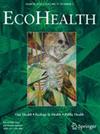巴西南部负鼠中SARS-CoV-2溢出。
IF 2.2
3区 环境科学与生态学
Q3 ENVIRONMENTAL SCIENCES
引用次数: 0
摘要
本研究的重点是监测巴西南大德州西诺斯河谷地区自由生活动物中的SARS-CoV-2,目的是利用下一代测序(NGS)技术验证这种新出现的病毒的存在。从52只白耳负鼠(Didelphis albiventris)中收集直肠和口腔拭子样本,并提交给元基因组学,随后指导SARS-CoV-2基因组测序。发现5个阳性样本来自于这些动物与人类排泄物或受污染的水体的接触,表明SARS-CoV-2向白氏弓形虫溢出。本文章由计算机程序翻译,如有差异,请以英文原文为准。
SARS-CoV-2 Spillback in Opossums, Southern Brazil.
This study focuses on monitoring of SARS-CoV-2 in free-living animals in the Vale dos Sinos region, Rio Grande do Sul, Brazil, aiming to verify the presence of this emerging virus using next-generation sequencing (NGS) technique. Rectal and oral swab samples were collected from 52 white-eared opossums (Didelphis albiventris) and submitted to metagenomics and subsequently directed SARS-CoV-2 genome sequencing. Five positive samples were found to originate from these animals' contact with human waste or contaminated water bodies, indicating the spillover of SARS-CoV-2 to D. albiventris.
求助全文
通过发布文献求助,成功后即可免费获取论文全文。
去求助
来源期刊

Ecohealth
环境科学-环境科学
CiteScore
4.50
自引率
4.00%
发文量
45
审稿时长
>24 weeks
期刊介绍:
EcoHealth aims to advance research, practice, and knowledge integration at the interface of ecology and health by publishing high quality research and review articles that address and profile new ideas, developments, and programs. The journal’s scope encompasses research that integrates concepts and theory from many fields of scholarship (including ecological, social and health sciences, and the humanities) and draws upon multiple types of knowledge, including those of relevance to practice and policy. Papers address integrated ecology and health challenges arising in public health, human and veterinary medicine, conservation and ecosystem management, rural and urban development and planning, and other fields that address the social-ecological context of health. The journal is a central platform for fulfilling the mission of the EcoHealth Alliance to strive for sustainable health of people, domestic animals, wildlife, and ecosystems by promoting discovery, understanding, and transdisciplinarity.
The journal invites substantial contributions in the following areas:
One Health and Conservation Medicine
o Integrated research on health of humans, wildlife, livestock and ecosystems
o Research and policy in ecology, public health, and agricultural sustainability
o Emerging infectious diseases affecting people, wildlife, domestic animals, and plants
o Research and practice linking human and animal health and/or social-ecological systems
o Anthropogenic environmental change and drivers of disease emergence in humans, wildlife, livestock and ecosystems
o Health of humans and animals in relation to terrestrial, freshwater, and marine ecosystems
Ecosystem Approaches to Health
o Systems thinking and social-ecological systems in relation to health
o Transdiiplinary approaches to health, ecosystems and society.
 求助内容:
求助内容: 应助结果提醒方式:
应助结果提醒方式:


